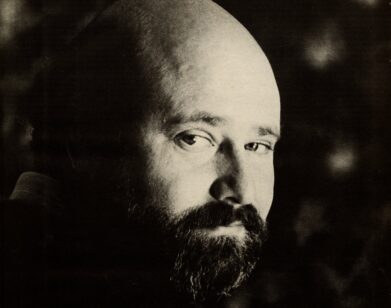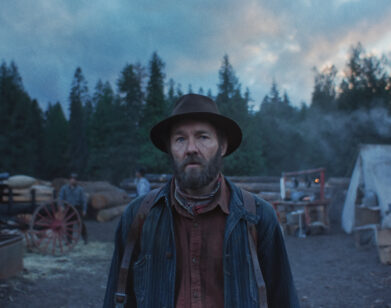Discovery: Shawn Christensen

ABOVE: SHAWN CHRISTENSEN IN NEW YORK, MARCH 2014. PHOTO BY CHRISTOPHER GABELLO.
Recovering heroin addict Richie is ready to end his life. He’s filled a bathtub with water, written a suicide note to his ex-girlfriend, Vista, and is in the process of slitting his wrists with a razor. The telephone rings: it’s his estranged younger sister, Maggie, and she wants Richie to pick up his niece Sophia from school, an 11-year-old “going on 30,” as director, writer, and star Shawn Christensen explains.
This scene bookends Before I Disappear, which debuted at SXSW earlier this week and co-stars Emmy Rossum as Maggie, Fatima Ptacek as Sophia, and Paul Wesley and Ron Perlman as Richie’s below-the-law bosses. Based on his 2012 Oscar-winning short Curfew, Before I Disappear is Christensen’s first feature as a filmmaker. “The first thing was this uncle taking care of his niece—but a very bad-influence type of uncle,” Christensen tells us of the film’s genesis. “Maybe he’s an uncle who’s at the end of his rope, and gets a call to take care of her, which is absurd. Once you open up the door to that kind of absurdity, it becomes fun,” he continues. “Most of the short film is in the feature; the only thing that’s changed is there are sub-plots now. There was no backstory with Richie, so he’s a bit more mysterious in the short film.”
Now in his early 30s, Christensen has already had a varied career: he’s released three albums with his band Stellastarr, and sold screenplays to major studios like Lionsgate. A glance at his film résumé, and several incongruities leap out from amidst the micro-budget shorts—namely that he is credited as the writer for Enter Nowhere (2011) and the Taylor Lautner film Abduction (2011). Don’t, however, let this color your opinion of him—both films were severely re-written. For Curfew and Before I Disappear, Christensen says that his only goal was “to make a film that was personal, but also where no one was fucking around with my writing. That was my problem at that point: people were screwing around with my screenplays. With the short film, I had no care about anything except for to make the best little film possible.”
AGE: 34
HOMETOWN: Poughkeepsie, New York
FAMILY BACKGROUND: My dad is an engineer. My mother was a librarian. She’s just a bookworm and so is my dad—that’s how they fell in love. I did have an uncle who was very artistic who I never really met, or remembered meeting, who committed suicide when I was very young. It was my mother’s side, [and] I went with her to Washington, D.C. or somewhere, to sort of investigate why he did it. But I was just a kid. I was just along for the ride. That’s all I remember. I don’t know what she came up with. But I heard he was a great artist.
Did my parents draw comparisons between my character in Before I Disappear and my childhood? I guess they should’ve, maybe. They haven’t commented on that. My parents, they see paintings I do or music or films and they just kind of nod their head and say, “This is lovely.” They’re very supportive, and they tell you if they like things more than others. They’re pragmatic, but they didn’t psychoanalyze. It’s kind of like that scene in American Beauty where Annette Bening tells her daughter, “I watched you the whole time and you didn’t mess up once.”
THE FIRST FILM I SAW…: Was Snow White, and that just blew my mind. I wanted to learn how all this worked. My dad started showing me how to make flipbooks, so I started making flipbooks with characters. And I watched all of the Disney films. I think I fell asleep during Fantasia the first few times, but then I started getting into it as the years went on.
“LIFE IS WHAT HAPPENS WHEN YOU MAKE OTHER PLANS”: I was pursuing acting while jamming in bands in college. I was probably a pretty average actor; I don’t really think I had anything worth bringing to the table. I went on tour for a few years with my band; having performed every night in front of all these people all over the world, I came back and I noticed a really vast difference—more confidence going on. The performing strengthened the way I felt I could portray myself. At least for camera acting.
I originally wanted to be an actor, and I used screenwriting as a mechanism to get into the industry. I actually really don’t consider myself an actor or a screenwriter, to be honest. I always do things to try to accomplish doing other things. If I want to direct, I’ll write a screenplay in order to direct. And then when I’m directing it, I’ll act in it in order to not have to explain what I want to somebody else. I don’t feel like I aspire to do these things. They just kind of happen.
AUDITION EXPERIENCES: When I was starting to audition, when I was out of college, it was always the handsome guy with the dark side—”he’s a charmer” and whatever the generic soap opera sentence was. I would be no good at those kinds of things. I would say I’m ultimately more character actor—a character that has some eccentricities or flaws or things that I can latch on to. If they feel like they’re a Ken doll, there’s definitely no way I could do those roles, ever. I’m not the guy. Have I tried? I auditioned for those things and felt like a damn fool. There’s always 20 guys in the casting office more beautiful than you are. But it was always the same description of these roles; it was always the same kind of guy, or the jock. Those roles I can’t do. I’m a “weakard;” I can’t do that kind of stuff. I wouldn’t want to.
STRENGTHS AND WEAKNESSES: I’m one of those guys who has a lot of great ideas when it comes down to a scene, or a series of scenes, the minutiae. But if you were to say to me, “Tell me five great movie ideas,” I’m not the guy. I have one movie idea a year at best, and then my strength is finding the characters and the scenes to fit into that idea. I can’t really come up with the main idea in the first place.
THE SHORT HAUL: With short films, you have to grab people immediately. In a feature film, you can hang around for 20 minutes and seduce people into your film. You don’t have that opportunity in a short film. You can do it that way, but people will turn it off—their attention span becomes shorter just by default when they hear the term “short film.” They’re expecting something that’s going to take them in immediately.
THE OSCARS: The live-action short film is probably the purest category of the Academy Awards, and also the most underappreciated. Growing up, I always took a bathroom break when the short film guys came on to win their awards. But there’s no lobbying, there’s no real press. You can, I’ve noticed short filmmakers do it, but it gets you nowhere. It causes more bad then good. We had the advantage of making this film and then watching it get whittled down to the shortlist and then the nominees and then winning without having to sell our souls or go on interviews. But the day before we shot Curfew, Luke Matheny had won for a short film called God of Love. My producer Damon [Russell] was like, “This guy’s from Brooklyn, he’s like us! We could go for the Oscars.” And I just looked at him and thought he was out of his mind. Damon encouraged me to submit it to some of the Oscar qualifying festivals, simply because there are a lot of scam festivals out there, a lot of festivals where you fly all the way out there and you find out it’s run out of some guy’s bedroom or something, and it’s worthless. You’ve wasted all this time and money. So at least with the Oscar eligible festivals you have a pretty good idea that they’re worth the trip if you get invited.
THE CAST: Paul [Wesley] helped produce Before I Disappear and was developing the script. I’ve been friends with Paul since we were kids, essentially. We went to acting classes together when we were teenagers. Emmy Rossum had the same teacher as us, but she was taking private lessons and doing musical theater at the time. I got the idea for Emmy pretty early on, because she came to a table read and the brother-sister chemistry was really there.
THE MUSIC : I wrote the song “Sophia So Far” for the short film and just put it into the feature. There’s a band called Future Islands, and I wanted their song for my short film, and they wanted more money than my entire music budget combined, including “Alexander,” which is Edward Sharpe, and Vera Lynn. I tried to negotiate with them and then they pulled out and said they didn’t want to be in the film. So I wrote that song out of desperation, because I needed a song there. Are people generally receptive to lowering fees? They’ll be receptive if you give them something that’s not generic. Like with “Alexander,” I just gave an email, saying “Hey, this is what the film’s about, this is how I’d use your song,” and they responded. I could easily have said, “I really like your music, man, I want to throw it into this scene three minutes in that’s on the stereo in the background.” And that doesn’t really excite the artist. So they’ll do it for a lower price if they like the way their song is portrayed in the project. With David Bowie, I wrote an impassioned email to David Bowie’s management and I said, “I love his music, it’s been very inspirational to me over the years, and I’d really love to use his song, but I have little money.” And then they wrote back and said “How little money are we talking about?” We put together a number for them, and then it was like, crickets. We gave them an embarrassing number. Radio silence. And then I put the clip that’s in the movie together, edited it the way it would be in the feature, and I sent that to them saying, “This is how your song would be used.” And two days later they said, “Okay, this looks good to us.”
FAVORITE DIRECTORS: For American directors, I admire P.T. Anderson, David Fincher, Woody Allen… it’s not very politically correct to say Woody Allen these days—”Even after last month?”—but as a filmmaker, a lot of films of his inspire me. For non-American: Alfonso Cuarón; he’s done phenomenal work. He also is an editor, which I admire. I always like when directors get into all the aspects of their filmmaking. Of all-time though, it’s Bergman, or it’s Kubrick, or it’s maybe Antonioni. I can’t really describe why they affect me. There’s definitely some Bergman, to me anyway, in this feature.
UP NEXT: I have three spec screenplays that are all halfway done, so I’m going figure out next month which one I’m going to pursue. They’re all pretty—I don’t want to say they’re “big,” but they’re much bigger in scope than this. It’ll be a different kind of movie, financing-wise. I don’t think I would sell a script again without some sort of either director approval or on-set thing—something that gives me the right to say, “Nope, you’re not going to put this director or this actor in this movie.” I will absolutely not allow that to happen again. I’d rather not make the movie or not sell the script.
BEFORE I DISAPPEAR IS CURRENTLY SCREENING AT SXSW.






